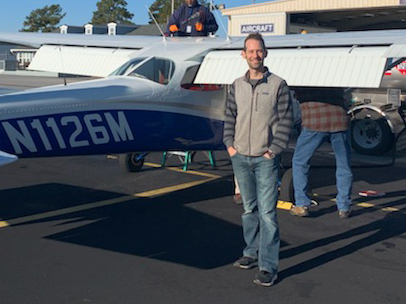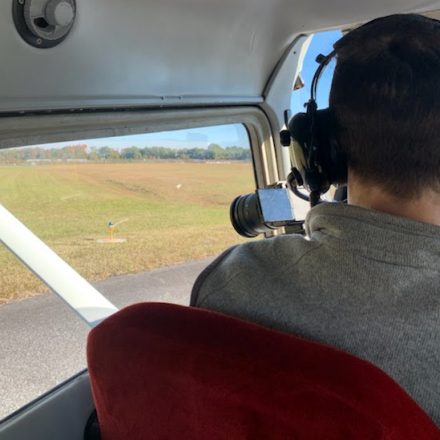The lecturer in cinema and television arts served as the directory of photography on Vox’s recent project highlighting large-scale pig farms – and their waste disposal – in the Tar Heel state.
Before Ryan Witt began his most recent freelance assignment, his would-be producer asked a simple, yet pointed, question, “Hey, are you OK being up in a Cessna?”

It was an important inquiry given that the topic – industrial hog farming and pig waste – required Witt, a cinema and television arts lecturer at Elon University, to spend four hours in a single-engine aircraft circling the farmlands of eastern North Carolina.
Witt agreed to the unique working conditions and served as director of photography for Vox’s recent YouTube video, “Hog farming has a massive poop problem,” released on Jan. 4. The 16-minute video, which has garnered more than 300,000 views since its release, features an in-depth look at manure lagoons (or basins) from hog farms and their impact on public health and the environment. These concerns, among many, include water contamination, air pollution and terrible odors. Historically, North Carolina has been a battleground state over the public health impact of hog farming.

“It was a fun experience, but really difficult,” said Witt of his aerial videography. “The airplane was really bumpy. I got motion sickness trying to shoot down through this tiny opening in the window. You had to open the window up to get the shot, and it was incredibly windy. It was four hours of very harrowing shooting.”
Over the course of four days in November, Witt recorded nearly all the footage shared in the Vox video – outside of a few drone shots. For most of the production, it was just Witt, Vox producer Laura Bult and a secondary cameraperson. While Witt had worked from a helicopter before, this was his first experience recording from a moving plane. And while much of the footage could have been shot with drones, legally it was not an option, Witt said.
“The interesting thing about this assignment, and why we flew up in the Cessna, is that there is apparently legislation in North Carolina – where the hog industry is so secretive about filming them from above – that doesn’t allow drone photography,” Witt said. “You have to get permission from the farmer. And guess what? That rarely happens. So, we worked around that by flying a small airplane, which is legal to do. That’s how watchdog groups and individuals monitor hog farmers. We used the plane instead of a drone.”
Many of the hog farms are secluded, often intentionally. So, the aerial footage is vital to illustrating the farmland and its potential issues. In fact, Bult begins the video noting that, “when I spoke to locals in the area, they told me the best way to understand this story is from the air.”
Wind and turbulence weren’t the only hurdles on the shoot, Witt pointed out. The plane could only hold four people, and initially the production team and gear exceeded the plane’s weight capacity. As a result, Witt ditched his large camera for smaller gear. And the airline had one other solution.

“They actually told us that they needed to find their lightest pilot to make it work,” Witt said.
The plane departed from New Bern and traveled over Duplin County, which has a robust concentration of hog farms, as well as Pasquotank and Harnett counties.
With the help of liaisons like Larry Baldwin of the Waterkeeper Alliance, the crew gained a better understanding of the terrain and could navigate possible pitfalls. While on the ground, Witt was very intentional with his gearing, selecting equipment that he could use to take long distance shots. While filming the farms from public streets is legal, landowners can sometimes be combative, Witt warned.
“It is a very tight-lipped industry and they don’t want media coverage, so we had to tiptoe around a bit,” Witt said.
In hindsight, Witt said what he saw was eye-opening. One hog farmer allowed the production crew to film on site, and that experience stays with him. As he navigated a narrow aisle in a hog barn, the humongous animals climbed over one another and snarled – the farmer did warn they might bite. The smell, conditions and waste were overwhelming after just 10 minutes, Witt recalled.
“I knew about the lagoons before, but I didn’t really know,” Witt said. “I’m a meat eater myself, but after going into the hog barn, it impacted me. We were only in there for a few minutes, and it smelled terribly. You walked out of there almost haunted. Their eyes are very human like and you felt terrible about how the pigs are treated. When I got back home, we didn’t cut out all meats, but we definitely started to think about where our meat is coming from.”
Witt said he expects individuals who watch the video to have similar takeaways. “When you don’t live near the farms, you don’t have to deal with the consequences – the smell, the possibility that your wells or the air are being poisoned,” Witt said. “Everyone seems to just turn a blind eye.”
This is the second time in the last 18 months that Witt has worked on a Vox project. In August 2020, he contributed to a water pollution video, titled “How ‘forever chemicals’ polluted America’s water,” that focused on the Cape Fear River Basin.


